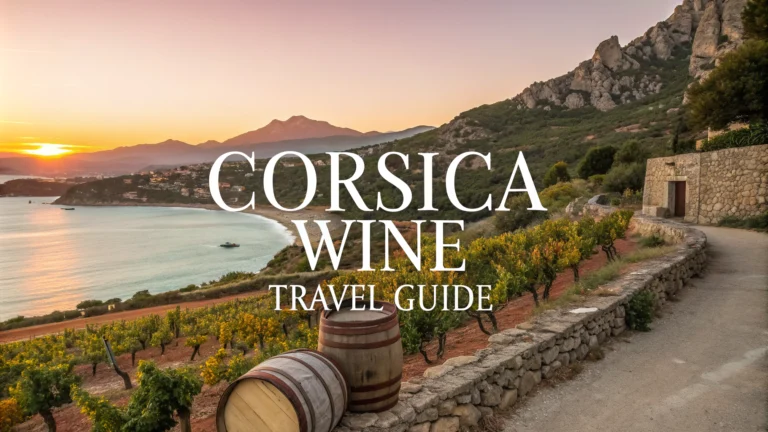Corsica’s Wine Charm
Corsica, the Mediterranean’s “Island of Beauty,” offers a unique blend of French and Italian influences in its wine and cuisine. This rugged island boasts diverse terroirs, producing distinctive wines from native grape varieties.
Wine Regions
Towns and Villages
Ajaccio, the capital, serves as an excellent base for wine exploration. Its charming old town and Napoleon Bonaparte’s birthplace add historical flair to your visit.
Patrimonio, in the north, is the heart of Corsican winemaking. This picturesque village is surrounded by vineyards and offers numerous tasting opportunities.
Calvi, with its beautiful citadel, provides a perfect blend of beaches and nearby wineries. Don’t miss the local rosés while enjoying the coastal views.
Wine Producers
- Domaine Comte Abbatucci: Known for biodynamic practices and rare indigenous grape varieties.
- Clos Canarelli: Produces exceptional wines in the southern Figari region.
- Domaine de Torraccia: A pioneer in organic viticulture on the island.
- Domaine Giacometti: Offers tastings with breathtaking views of the Désert des Agriates.
Accommodations
La Villa Calvi offers luxury with vineyard views. For a more intimate experience, try U Palazzu Serenu, a boutique hotel in Saint-Florent near Patrimonio’s wineries.
In Ajaccio, Hotel Les Mouettes provides seaside charm with easy access to the city’s wine bars.
Dining
A Mandria di Pigna in Pigna serves traditional Corsican cuisine with an extensive local wine list. For seafood and wine pairings, visit Le Cabanon Bleu in Porto-Vecchio.
In Ajaccio, Le 20123 offers innovative dishes showcasing Corsican ingredients and wines.
Wine Shops & Bars
Le Vin Des Sens in Ajaccio offers a wide selection of Corsican wines and conducts regular tastings. In Bastia, visit La Cave Bastia for its extensive collection and knowledgeable staff.
For a unique experience, try U Stabiacciu in Porto-Vecchio, a wine bar that doubles as an art gallery.
Other Shops
Visit A Buttega di Vinu in Calvi for local products like charcuterie and cheese to pair with your wine purchases. In Ajaccio, Les Délices de Corse offers a range of Corsican specialties.
For wine-related gifts, check out La Maison des Vins in Patrimonio, which sells locally made corkscrews and wine accessories.
Attractions
Between wine tastings, explore the Scandola Nature Reserve, a UNESCO World Heritage site. The dramatic red cliffs and crystal-clear waters provide a stunning backdrop for a boat tour.
Visit the Maison Bonaparte in Ajaccio to learn about Napoleon’s Corsican roots. For a beach day, head to Palombaggia Beach near Porto-Vecchio.
Events
- Patrimonio Wine Festival (July): Showcases wines from the Patrimonio AOC with tastings, music, and local food.
- Fiera di u Vinu (August): A celebration of Corsican wines in Luri, featuring tastings and traditional music.
- Ajaccio International Film Festival (October): Combines cinema with wine tasting events.
Appellations
Corsica boasts nine AOC (Appellation d’Origine Contrôlée) regions:
- Patrimonio: Known for its robust reds and mineral-driven whites.
- Ajaccio: Produces full-bodied reds and aromatic whites.
- Calvi: Renowned for its rosés and light reds.
- Figari: Offers complex reds and whites from southern Corsica.
Other appellations include Cap Corse, Côtes de Provence, Porto-Vecchio, Sartène, and Vin de Corse.
Grape Varieties
Corsica boasts a unique blend of indigenous and imported grape varieties. Nielluccio and Sciaccarello are the island’s prime red grapes.
White varieties include Vermentino (locally known as Malvoisie de Corse) and Biancu Gentile. These grapes contribute to Corsica’s distinctive wine profile.
Main Wine Styles
Corsican wines range from light, fresh whites to robust, full-bodied reds. Rosé wines are particularly popular, accounting for a significant portion of production.
Red wines often blend Nielluccio with Grenache and Sciaccarello, resulting in complex, Mediterranean-style wines. White wines showcase Vermentino’s crisp, aromatic character.
Food Specialties
Corsican cuisine reflects its mountainous terrain and coastal location. Charcuterie, especially wild boar sausages, pairs excellently with local red wines.
Brocciu, a fresh sheep’s milk cheese, complements white wines. Chestnuts feature prominently in many dishes, offering unique wine pairing opportunities.
Drives & Walks
The Route des Vins offers a scenic drive through Corsica’s wine regions. This route connects major wineries and picturesque villages.
For hiking enthusiasts, the GR20 trail provides breathtaking views of the island’s diverse landscapes. Many wineries offer guided walks through their vineyards.
Itineraries
3-Day Wine Tour: Start in Ajaccio, visiting Clos Ornasca. Head to Sartène for Domaine Saparale, then finish in Patrimonio at Domaine Orenga de Gaffory.
Week-long Exploration: Combine winery visits with coastal towns and mountain villages. Include stops in Calvi, Corte, and Porto-Vecchio for a comprehensive Corsican experience.
Getting There & Around
Corsica has four airports: Ajaccio, Bastia, Calvi, and Figari. Ferry services connect the island to mainland France and Italy.
Renting a car is the best way to explore Corsica’s wine regions. Public transportation is limited but available between major towns.
Best Time to Visit
The ideal time to visit Corsica for wine tourism is May to June or September to October. These months offer pleasant weather and fewer crowds.
Harvest season (September) provides unique winery experiences. Summer (July-August) is peak tourist season with higher prices.
Sustainability Efforts
Many Corsican wineries practice organic viticulture. Domaine Comte Abbatucci is a leader in biodynamic winemaking.
Eco-tourism initiatives promote responsible travel. Look for accommodations and tour operators with sustainability certifications.
Language Tips
French is the official language, but Corsican is widely spoken. Learning a few Corsican wine terms can enhance your experience:
- Vinu: Wine
- Salute: Cheers
- Cantina: Winery
Further Resources
Visit the Corsica Tourist Board website for comprehensive travel information.
For in-depth wine knowledge, consult “Wines of Corsica” by Tom Fiorina or join online Corsican wine communities.

